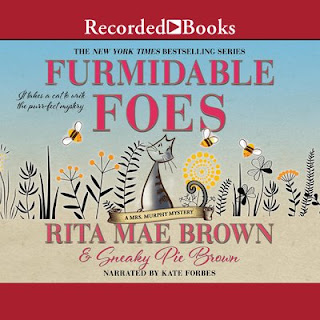I liked this audiobook.
Normally, I love Rita Mae Brown's books. Mystery, cats, dogs, and occasionally other animals as characters, people I like. In this one, though, she does, repeatedly, a thing that annoys me, a basic factual error, that isn't particularly important to the story--except it's apparently very important to one of the characters, given how often it comes up with that character. But more about that later.
Meanwhile, the Dorcas Guild is reworking St. Luke's gardens to more closely reflect how the church grounds looked in the 1780s. This of course includes the grave of the unknown woman, buried on top of another grave in 1786, wearing an elaborate, extremely valuable pearl necklace. Forensic analysis of the bones shows that this was a black woman, so almost certainly a slave. Moreover, she was murdered--her neck was broken. Why then was she buried with that valuable necklace? It seems to make no sense, but they'll probably never know the answers. Also, the necklace is the subject of some contention within the church community. Should it be sold to raise money for the church? Put on display? Placed in a museum?
This, of course, ties in to the part of the story that is set in 1787 and 1788. It's in this part of the story that we do, in fact, learn who the woman was, why she was murdered, and why the necklace was buried with her. This also means following the stories of three runaway slaves, and the owners of the two plantations they come from. Big Rawly is owned and run by Mrs. Maureen Selisse Holloway, who is very cruel and just plain mean for the sake of mean. Mr. Ewing Garth Cloverfields, and is a much more kindly father to his family and owner of his slaves. He's mostly thought of by the people around him, He's certainly nicer than Maureen Holloway.
He's still a slave owner, and his thoughts on slavery and possible abolition are, well, disappointing. He does not think it would be a good thing--for the slaves, you know. They're "not ready for it." Right.
Ewing Garth is the person who keeps thinking about the state of the new United States, in which the new Constitution has been written, but not yet ratified. In thinking about slavery, and the state of the country, he keeps saying that there are only two free states in the country, Pennsylvania and Vermont. And that's wrong.
The states that had abolished slavery by 1787 were:
Vermont -- 1777
Pennsylvania -- 1780
Massachusetts -- 1781
New Hampshire -- 1783
Connecticut -- 1784
Rhode Island -- 1784
So six states abolished slavery before 1787. And this is pretty easy to check, and one would think the politically aware Ewing Garth, slaveowner and major plantation owner himself, would be aware of the facts on this. It might well be important to him in very practical ways, to know which way the temper of the country was going on slavery.
But Mr. Garth is just a character on the page, and Rita Mae Brown is a woman living in the 21st century, with a knowledge of how to do basic research, and access to the internet. This is a bizarre mistake. Does it mean anything? Maybe only that Brown's characters, and perhaps Brown, love Virginia as much as I love Massachusetts, and perhaps she also feels similar fondness for Pennsylvania, where she is originally from.
So this is probably all irrelevant to most, and I'd probably have passed right over it, if it hadn't been repeated over and over. I'm cranky about facts, and history in particular. When an author makes a mistake that I recognize, it makes me wonder what mistakes they've made that I don't have the background knowledge to recognize, and yes, it's fiction, but I like the background facts to not be wrong. I know little to nothing about farming; is Harry Harristeen uttering howlers I don't recognize? I would hate that if I found out!
But I enjoyed the story anyway, and I'm probably annoying people more by being so longwindedly cranky about it, but there it is. It's the kind of thing that annoys me.
Nevertheless, recommended.
I bought this audiobook.

No comments:
Post a Comment